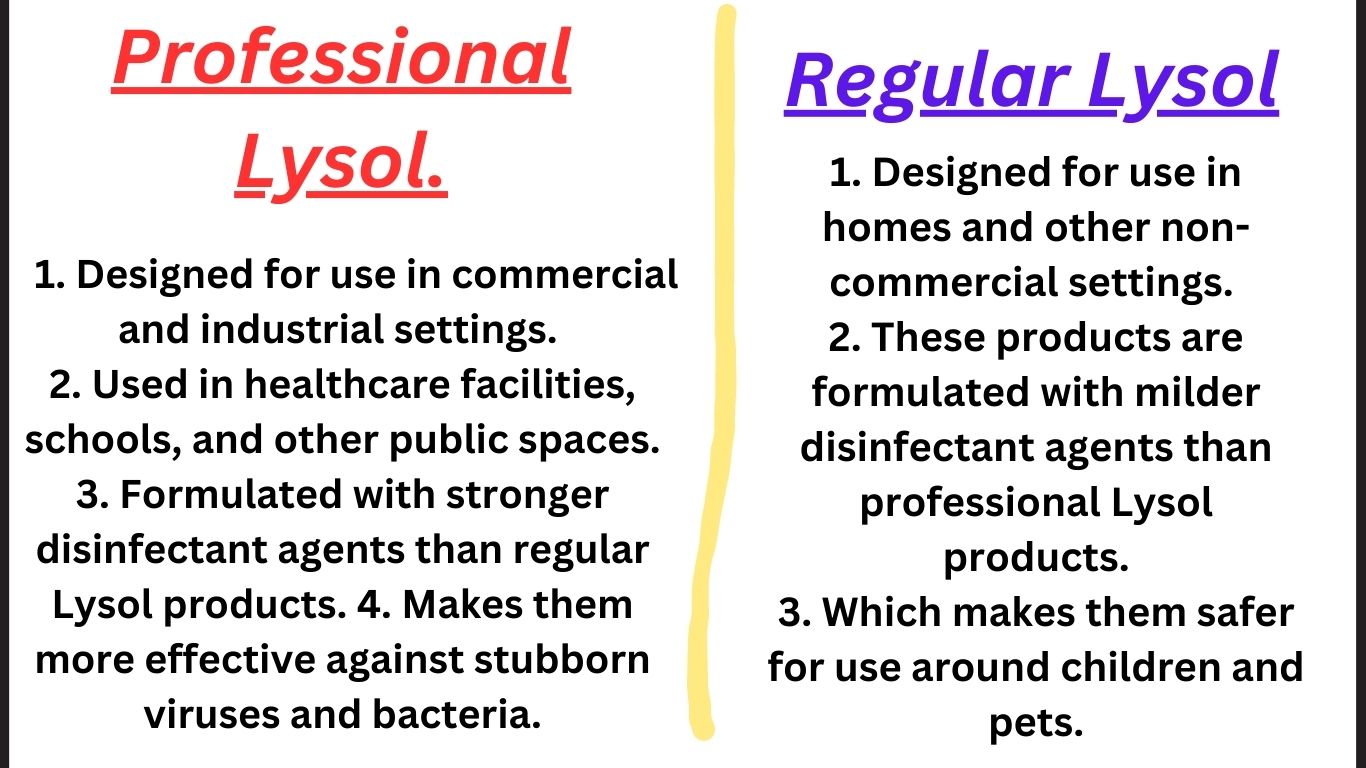Lysol is a popular brand of disinfectant products that are widely used for cleaning and disinfecting homes, workplaces, and public spaces. The company produces a variety of disinfectant sprays and wipes, including both professional and regular Lysol products. However, many people wonder what the difference is between these two types of Lysol products. In this article, I will look at the key differences between professional Lysol and regular Lysol.
In the wake of the COVID-19 pandemic, disinfectants have become a crucial part of our daily lives. However, not all disinfectants are created equal. Lysol is one of the most popular disinfectant brands in the market, and it offers both professional and regular Lysol products. But what is the difference between them? In this article, I will answer this question and help you understand which one is right for your needs.
What is Lysol?
Lysol is a brand of disinfectant products that has been around for over a century. The company produces a variety of disinfectant sprays and wipes that are designed to kill germs and viruses on surfaces. Lysol disinfectants are effective against a wide range of pathogens, including the flu virus, E. coli, and MRSA.
What is Professional Lysol?
Professional Lysol is a line of disinfectant products that are designed for use in commercial and industrial settings. These products are typically used in healthcare facilities, schools, and other public spaces where there is a high risk of infection. Professional Lysol products are formulated with stronger disinfectant agents than regular Lysol products, which makes them more effective against stubborn viruses and bacteria.
What is Regular Lysol?
Regular Lysol is a line of disinfectant products that are designed for use in homes and other non-commercial settings. These products are formulated with milder disinfectant agents than professional Lysol products, which makes them safer for use around children and pets.
Key Differences Between Professional Lysol and Regular Lysol
Ingredients.
The main difference between professional Lysol and regular Lysol is the strength of their disinfectant agents. Professional Lysol products contain stronger disinfectant agents than regular Lysol products. For example, professional Lysol disinfectant spray contains 58% ethanol and 0.1% alkyl dimethyl benzyl ammonium saccharinate, while regular Lysol disinfectant spray contains 19% ethanol and 0.1% alkyl dimethyl benzyl ammonium saccharinate. This means that professional Lysol is more effective against stubborn viruses and bacteria.
Effectiveness.
Professional Lysol is more effective than regular Lysol when it comes to killing germs and viruses. Professional Lysol products are designed to be used in high-risk environments where there is a higher chance of infection. Regular Lysol products, on the other hand, are designed for use in homes and other low-risk environments. While regular Lysol is still effective against most common viruses and bacteria, it may not be as effective against stubborn strains.
Uses.
Professional Lysol products are designed for use in commercial and industrial settings, while regular Lysol products are designed for use in homes and non-commercial settings. Professional Lysol products are typically used in healthcare facilities, schools, and other high-risk environments to prevent the spread of infection. They are also used in industrial settings to disinfect equipment and surfaces. Regular Lysol products, on the other hand, are designed for use in homes and other low-risk environments to disinfect surfaces and kill germs and viruses.
Which One Should You Use?
The decision on which type of Lysol to use depends on the setting and the level of risk of infection. If you are in a high-risk environment, such as a hospital or school, it is recommended that you use professional Lysol products. These products are designed to kill stubborn viruses and bacteria and prevent the spread of infection. If you are using Lysol products in your home or non-commercial setting, regular Lysol products will suffice.
Conclusion.
In conclusion, the key differences between professional Lysol and regular Lysol are the strength of their disinfectant agents, their effectiveness against stubborn viruses and bacteria, and their intended uses. Professional Lysol is designed for use in high-risk environments, while regular Lysol is designed for use in homes and other low-risk environments. Both types of Lysol products are effective in killing germs and viruses, but professional Lysol is more effective against stubborn strains.
FAQs on What is the Difference Between Professional Lysol and Regular Lysol.
Can I use professional Lysol in my home?
While you can use professional Lysol in your home, it is not necessary unless you are in a high-risk environment.
Can I use regular Lysol in a hospital setting?
It is not recommended to use regular Lysol in a hospital setting as it may not be effective against stubborn viruses and bacteria.
Is professional Lysol safe for use around children and pets?
Professional Lysol products contain stronger disinfectant agents than regular Lysol products, which may not be safe for use around children and pets.
Can I use regular Lysol to disinfect my phone?
Yes, regular Lysol is effective in disinfecting phones and other surfaces.
Can Lysol products prevent the spread of COVID-19?
While Lysol products are effective against many common viruses and bacteria, there is no evidence that they can prevent the spread of COVID-19. It is still recommended to practice good hygiene and social distancing to prevent the spread of the virus.

